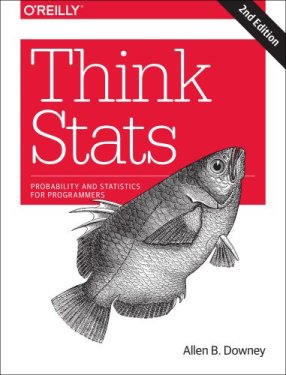
|
FreeComputerBooks.com
Links to Free Computer, Mathematics, Technical Books all over the World
|
|
- Title: Think Stats, 2nd Edition: Exploratory Data Analysis in Python
- Author(s) Allen B. Downey, et al.
- Publisher: O'Reilly Media; 2 edition (November 7, 2014); eBook (Creative Commons Licensed)
- License(s): Creative Commons License (CC)
- Paperback: 226 pages
- eBook: HTML and PDF (242 pages, 1.8 MB)
- Language: English
- ISBN-10: 1491907339
- ISBN-13: 978-149190733
- Share This:

|
If you know how to program, you have the skills to turn data into knowledge, using tools of probability and statistics. This concise introduction shows you how to perform statistical analysis computationally, rather than mathematically, with programs written in Python.
You'll work with a case study throughout the book to help you learn the entire data analysis process from collecting data and generating statistics to identifying patterns and testing hypotheses. Along the way, you'll become familiar with distributions, the rules of probability, visualization, and many other tools and concepts.
About the Authors- Allen B. Downey is an American computer scientist and a former Professor of Computer Science at the Franklin W. Olin College of Engineering.
- Statistics and Mathematical Statistics
- Probability and Stochastic
- Python Programming
- Data Analysis and Data Mining
- Data Science and Big Data

- Think Stats, 2nd Edition: Exploratory Data Analysis in Python (Allen B. Downey)
- The Mirror Site (1) - PDF, ePub, Kindle, etc.
- The Mirror Site (2) - PDF
-
 Think Stats: Exploratory Data Analysis in Python, 3rd Edition
Think Stats: Exploratory Data Analysis in Python, 3rd Edition
If you know how to program, you have the skills to turn data into knowledge. This thoroughly revised edition presents statistical concepts computationally, rather than mathematically, using programs written in Python
-
 O'Reilly® Think Bayes: Bayesian Statistics in Python
O'Reilly® Think Bayes: Bayesian Statistics in Python
If you know how to program, you're ready to tackle Bayesian statistics. With this book, you'll learn how to solve statistical problems with Python code instead of mathematical formulas, using discrete probability distributions rather than continuous mathematics.
-
 Learning Statistics with Python (Ethan Weed)
Learning Statistics with Python (Ethan Weed)
This book explains basic concepts of statistics within the framework of using Python. The blending of statistics and computer coding has quickly become a standard in research to in both academia and industry.
-
 Statistics and Machine Learning in Python (Edouard Duchesnay)
Statistics and Machine Learning in Python (Edouard Duchesnay)
Illustrates the fundamental concepts that link statistics and machine learning, so that the reader can not only employ statistical and machine learning models using modern Python modules, but also understand their relative strengths and weaknesses.
-
 Regression Analysis using Python (Eric Marsden)
Regression Analysis using Python (Eric Marsden)
Become competent at implementing Regression Analysis in Python Through the book, you will gain knowledge to use Python for building fast better linear models and to apply the results in Python or in any computer language you prefer.
-
 Introduction to Statistical Learning: with Applications in Python
Introduction to Statistical Learning: with Applications in Python
This book covers the same materials as Introduction to Statistical Learning: with Applications in R (ISLR) but with labs implemented in Python. These labs will be useful both for Python novices, as well as experienced users.
-
 Introduction to Modern Statistics (Mine Çetinkaya-Rundel, et al.)
Introduction to Modern Statistics (Mine Çetinkaya-Rundel, et al.)
This book puts a heavy emphasis on exploratory data analysis and provides a thorough discussion of simulation-based inference using randomization and bootstrapping, followed by a presentation of the related Central Limit Theorem based approaches.
-
 Foundations in Statistical Reasoning (Pete Kaslik)
Foundations in Statistical Reasoning (Pete Kaslik)
This book is designed for students taking an introductory statistics class. The emphasis throughout the entire book is on how to make decisions with only partial evidence. It focuses on the thought process.
-
 Theory of Statistics (James E. Gentle)
Theory of Statistics (James E. Gentle)
This book is directed toward students for whom mathematical statistics is or will become an important part of their lives. It covers classical likelihood, Bayesian, and permutation inference; an introduction to basic asymptotic distribution theory; and modern topics.
-
 Statistics Done Wrong: The Woefully Complete Guide (Reinhart)
Statistics Done Wrong: The Woefully Complete Guide (Reinhart)
Scientific progress depends on good research, and good research needs good statistics. But statistical analysis is tricky to get right, even for the best and brightest of us. You'd be surprised how many scientists are doing it wrong.
-
 Lies, Damned Lies: How to Tell the Truth with Statistics
Lies, Damned Lies: How to Tell the Truth with Statistics
The goal is to help you learn How to Tell the Truth with Statistics and, therefore, how to tell when others are telling the truth ... or are faking their "news". Covers Data Analysis, Binomial and normal models, Sample statistics, confidence intervals, hypothesis tests, etc.
-
 Answering Questions with Data : Introductory Statistics
Answering Questions with Data : Introductory Statistics
This is a free textbook teaching introductory statistics for undergraduates. Students will learn to select an appropriate data analysis technique, carry out the analysis, and draw appropriate conclusions.





